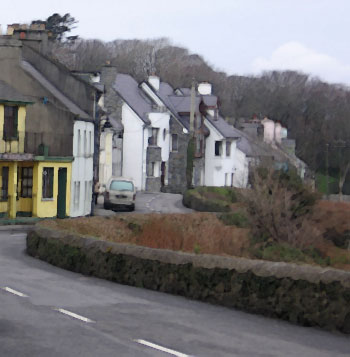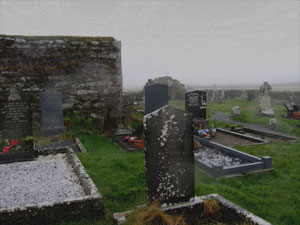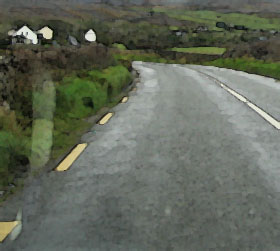
|
|||
|
|||
| Home |
| Gallery |
| Culture/ Technology |
| Fiction |
| Music |
| Poetry |
| Theater |
| What's New |
| About/Contact |
| Archive |
|
The Man Was Known As Ray Late on the sixth day, God was frantically creating the odds and ends, bits and pieces of humankind and He created a man he forgot. The man was known as Ray. Ray was now a tinker and owned a shop in the little village of Conroy, Ireland. His shop was in a nondescript wooden, weather-beaten building, the flat roof covered with black tar paper on one side. There was a small white sign in the dirty window: "Tinker's Damn Good Repair."
People from villages as far away as County Derry in Northern Ireland came in desperation to Ray's shop to save some priceless object they cherished and wanted to fix and keep alive – tea makers that looked like space ships, gleaming waffle irons, radios with crystal diodes, sprinkler systems, lamps that rode on magic carpets and fountain pens that lit up. Ray was single now and had given up women – or at least thoughts of a wife for awhile. His last child had died 250 years earlier and Ray was in no rush to raise another family. He liked children and, of course, a good wife was a precious jewel, but for now he would remain a single man. It was difficult watching a young woman you love grow old and die before you did. To watch his children die was even worse. Ray closed the shop at 4 p.m. and walked toward the Hare Raiser pub as he had done for many years. Suddenly he stopped and knew he would have to move away in the morning. He was sad and yet he smiled and looked around at the little village, the smoke coming from thatched roofs, sheep grazing in the far-off green fields. Ireland was indeed a beautiful place and he would leave in the morning. Maybe he could come back in 100 years. He looked down the quiet street and saw his oldest and best friend, Peter McPeak walking to meet him at the pub. Peter was an older man who walked as if he was stepping on broken glass. He coughed a lot, shoulders drooped, was hard of hearing and forgetful at times. But his Irish eyes still twinkled, his mind was clear and his tongue always sharp – that is, after three beers. In the late afternoon, like they had done for years, they sat and talked to themselves, each other and anybody who wandered in. Ray knew this was the last time they would be together. He had gone through this so many times. He just knew time was up. Ray lowered his head and headed down toward the pub for the last time. "So, Ray, you're quieter than normal today. For a moment there I thought you were dead." Quietly talking to himself, staring off across the pub, "Just been thinking about life ..." Quickly coming back in high Irish brogue: "No chance of that, the good Lord has forgotten about me and the saints can't preserve me." Peter laughed with his head back. "Now I don't want to be answering for the good Lord, but I'd imagine you're still on that big ledger in the sky." "Maybe my page is missing. Peter, do you ever think about dying?" The question startled Peter. "At my age, every day. And the day I don't think about it is the day I die. That's the way I figure it." A voice echoed from way back in the pub, "Me too." "I think about dying all the time, too." "Ray, you're still a young man." "Young? I'm the oldest person you know." "Nonsense. How old are you? Fifty?" "Add half a dozen zeros to that number and you're closer to the truth." "Your hair is starting to turn gray at the temples, Ray. You are getting older." "I dye my hair gray to appear older. It gives me more time to live in one place before people noticed I don't age." Peter rose up and shouted to Jonnie the barkeeper: "How long has Ray been drinking and how much has he drunk?" Jonnie was reading a newspaper and didn't look up. "You two came in together." "Yea, that's right. We came in together." Peter scratched his head under his cap.
"I'm just feeling morose. I'm older than the hills and twice as dusty." "Well now, those hills are pretty old. Don't tell me you were around when the Almighty made everything?" "No, not that old. I was around when they discovered fire." "Really now?" Peter knew his old friend Ray was known for his kiss of the Blarney stone – which he claimed to have done in 1632. "And I was around when the wheel appeared," Ray said, holding his beer way out, black tinged foam running down the sides. "That old?" "I sailed with the Greeks to Troy to rescue Helen." Peter didn't blink an eye, just listened and drank. "And when did you come to this part of the world, Ray?" "Right after I help build Stonehenge." "How did that go?" "Well, there was a lot of pulling and pushing, but the stones made it in place." Somebody asked, "Did you build the pyramids in Egypt?" "No, not the big ones. Only some small tombs in the Valley of the Kings. Did you know Rameses the Second had red hair?" "What else, Ray?" a voice asked from somewhere in the pub. "I was a Celtic mercenary for Cleopatra in Egypt." "Have you ever gotten depressed and thought about killing yourself, knowing you were going to live forever?" Jonnie the barkeeper asked, joining in the conversation. "Yeah, Ray, have you ever thought of killing yourself?" someone asked nearby. "I tried to commit suicide by jumping out one of the first hot-air balloons in France around 1734, but I just broke both my legs and arms. "That was the only time, Ray?" "No, I was in the charge of the Light Brigade that Tennyson immortalized, but a bullet never hit me and I was awarded a medal for bravery." "So what made you come to Ireland?" "I first came to fight with Brian Boru. After doing that awhile, I figured killing my fellow man and woman was not something I wanted to do the rest of eternity. So now, I mostly live in Ireland as I do now and other places around the world from time to time." Jonnie asked, "So Ray, how did you live through the famine?" "I lost a lot of weight. With people dying all around it was a gruesome sight. Especially for me not ever dying and having to see my children and friends die before my eyes. I'm still human. Some times, I get so depressed I go to bed and pray to God to come and take me in my sleep." "Ray, where are you going to live next?" "This time I want to sail the Mediterranean Sea." "Sounds too sunny for an Irishman, Ray?" A voice from down the bar asked with a laugh. "Ray, I'm older than you are and I will die before you." Peter said. "Half of that's true, Peter." "Well, I finally got you to agree with me. Besides all this talk about dying and death. Dying is overrated as far as I'm concerned." "That's easy for you to say. You're going to die," Ray said, and three people laughed at the bar. Ray laughed himself and ordered two more beers and the men stood silent for awhile. Suddenly he said, "Come with me." "Where are we going in such a rush? What about our beers?" "No one will drink them. Jonnie will see to that." "Where are we going?" Peter asked again. "The cemetery." "What?" "Don't worry. All the banshees and ghosts won't bother us. And I don't think the people there mind. I go up there every day now and look around." "But I mind. I promised myself the next time I go in there I want to be carried in." Peter said. "Don't worry, you will be."
All the way it was slow going for Peter. He was trying to walk straight and true, but his body refused to do so. "I wish I had my cane. I could fall and kill myself." "Since we're already here, we'll just roll you over to a grave hole and drop you in. Services later." Peter was not so sure what their little sojourn was all about. He trusted Ray and knew there must be some reason, foolish or otherwise, why they were going into the cemetery. "Now exactly why are we here, Ray?" "We're all going here. I mean, except me." "If you keep up with this nonsense I'm going back to the pub and finish my beer and yours." "See this grave over here," Ray said, directing Peter to a weather-beaten headstone that was leaning like the Tower of Pisa. "Yes, I see it." "This is the grave of one of my children. His name was Cedric." Peter looked the headstone over and he could tell it was very old. "Are you sure? It looks terribly old." "It is. He died in 1606. This grave over here is one of my wives. A good women she was. Her name was Sarah. She died in 1702." Peter didn't react but just stood there staring down at the grave stones in the dim light. Finally he turned to his friend and said, "Ray, you're not feeling well today. All this talk about dying and such, well, here we are in a grave yard and ..." Peter's voice faded away. Finally Ray said solemnly, "I come up here most every day and just walk around wondering why the good Lord forgot me." "Once again, I'm speaking for the Almighty, but there must be some reason for all this," Peter said, afraid to mention dying again. He was worried that his best friend had gone over the edge and didn't want to call him mad. "Yeah, maybe the good Lord was so busy creating he just misplaced you." Ray suddenly sounded happy. "That's what I thought the reason was, too." "We agree on another thing. Look at it this way, Ray: When you do go to heaven think of how many wives and children and friends will be there to greet you. I promise to be there myself. Why, it will be the biggest homecoming heaven has ever seen. I'm sure all the saints, angels and Mother Mary herself will be there when little old you pass beneath the Pearly Gates." "Yeah, I suppose so. I hope to see you there, Peter. You're my oldest friend." "Yeah, me too, Ray. Let's get back to the pub. It's too dark and I don't want to fall. Besides I will spend enough time here someday anyway." "Peter, you're right. For dragging you up here, the drinks are on me the rest of the night." Laughing, Peter said, "Now I think I've died and gone to heaven, Ray." The two men slowly and silently walked back to the pub. Their beers were just where they left them. They sat down and spent the rest of the night talking and laughing with friends and listening to music, just like they had done a thousand times. Just before closing time, Peter turned and said, "Now, Ray, I want you to take care of yourself. All this talk about dying and such, well, I just want you to take care. It's not good to talk of dying all the time." Ray smiled and looked at Peter for a long time like he was trying to remember him forever. "That's what I've been thinking too, Peter."
He sat on the edge of his bed and stared into the darkness and prayed to God to find his lost name or number or however God kept track. In the dark, Ray said, "Living forever doesn't mean I have no feelings." The next day word spread around the village that old man Peter McPeak had passed away in the night. At his funeral everybody noticed that Ray was not there. Someone said they saw him walking down the road out of the village with a satchel flung over his shoulder and sailor's cap on. Published March 2007 |
Copyright ©
Reprinted by permission of author, who retains all copyright and control.

 Inside, the shop looked like a hurricane, earthquake and naughty children had "de-ranged" the entire shop's shelves. Every nook and cranny was crammed with misshapen metal, old books, small parts, tools, crumpled yellow papers and blinking lights. Ray claimed he knew where every single widget and doohickey was. No one doubted him. He could speak Gaelic and played the piano like Beethoven. He read Sanskrit. As far as what he looked like, he was nondescript in every way. You could never pick him out in a crowd.
Inside, the shop looked like a hurricane, earthquake and naughty children had "de-ranged" the entire shop's shelves. Every nook and cranny was crammed with misshapen metal, old books, small parts, tools, crumpled yellow papers and blinking lights. Ray claimed he knew where every single widget and doohickey was. No one doubted him. He could speak Gaelic and played the piano like Beethoven. He read Sanskrit. As far as what he looked like, he was nondescript in every way. You could never pick him out in a crowd. The two men quietly took another drink of their beer and then Peter calmly said, "Hey, I feel that old sometimes myself."
The two men quietly took another drink of their beer and then Peter calmly said, "Hey, I feel that old sometimes myself." The two men walked out of the pub and silently wandered down the road and up to the little village cemetery that was surrounded by a small, white picket fence. The cemetery was crammed with leaning Celtic crosses and rock chiseled markers. The old headstones looked more like rocks with unreadable inscriptions. All the shapes filled the cemetery grounds like a forest of granite. Some of the little family mausoleums had cherubs playing harps on the corners of the roofs.
The two men walked out of the pub and silently wandered down the road and up to the little village cemetery that was surrounded by a small, white picket fence. The cemetery was crammed with leaning Celtic crosses and rock chiseled markers. The old headstones looked more like rocks with unreadable inscriptions. All the shapes filled the cemetery grounds like a forest of granite. Some of the little family mausoleums had cherubs playing harps on the corners of the roofs. Both men turned and went their separate ways home in the pale moonlit night. When Ray got home he was very sad. He was always sad to leave. It was never easy to live in one place for fifty years or so and then leave. It never got easier. He thought of his friend Peter and all the times they had laughed together in the pub. Yes, leaving was the hardest part of living forever. As he packed his small satchel bag, Ray tried to reassure himself that the next place he called home would have interesting people. There he would make new friends, maybe fall in love and have children again.
Both men turned and went their separate ways home in the pale moonlit night. When Ray got home he was very sad. He was always sad to leave. It was never easy to live in one place for fifty years or so and then leave. It never got easier. He thought of his friend Peter and all the times they had laughed together in the pub. Yes, leaving was the hardest part of living forever. As he packed his small satchel bag, Ray tried to reassure himself that the next place he called home would have interesting people. There he would make new friends, maybe fall in love and have children again.